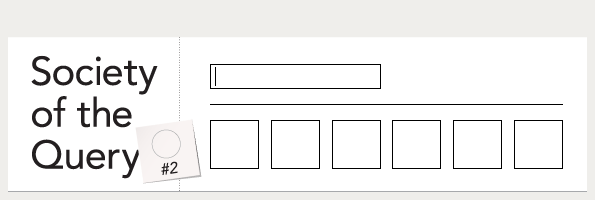Short interview with Kylie Jarrett from network cultures on Vimeo.
In this first session of Friday Kylie Jarrett talks about the history of search, going back to metaphysical desires on historical information technologies but focusing as well on Google and contemporary search engines. Kylie highlights two sources of deep importance in the history of search; past practices that are still valuable to understand the current culture of networked search.
On the one hand she puts the example of Atomism, an ideology of ancient traditions that beliefs that the whole world can be reduced to atomism, that is to say, to void and materiality. That distinction between void and materiality anticipated the current binary distinction characteristic of our digital age. Theories of atomism claim that our bodies are aggregated bits of information. Consequently, reality is constituted in abstraction and reducible . That is to say, we can reduce all the information, all the knowledge, to an storage device; the best example is Google. Atomism, by understanding the knowledge as something divisible from which patterns are generated, creates the basis of Google’s personalize form of search.
On the other hand, she also points out the foundation of the tower of Bable and she compares it with a universal library. The myth teaches us that when all the power and knolwledge is located in one only place (such as language or a universal library), is subjected to corruption. In other words, the tower of Bable is like fabricating a code that ends up being independent from its makers. She suggests that the attempt to organize all the knowledge into a single place might produce an overload of information as well as a brake between meaning an information. Once again, she parallels this myth with a search engine like Google, in which all the knowledge is located in a single search engine. Indeed, it seems that what does not exist on Google, does not exist in life. There is no truth, there are millions of truths, each truth is personalized for each individual.

She also refers to the notion of metaphysics of search and shows the example of Llull’s thinking machine in which a machine is used to combine elements of thinking – for instance, elements of language-. Llull’s machine made logical reductions in a mechanical way. He demonstrated that human thought can be described by a device and anticipated our current digital system. As Kylie suggests, this is the idea that knowledge can be reduced to abstract principles and therefore create an universal index of the world. This is the universality of Google’s index and its domination. To conclude, Kylie holds that we have to understand why Google dominates the world and be aware of our complicity with it. Why we enable Google to take that big space in our lives? -“Only when we will understand search origins we will understand something like Google”.
Society of the Query #2 – Kylie Jarrett: Search for the Google God: Metaphysics and the Social Imaginary of Search from network cultures on Vimeo.


